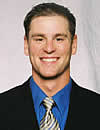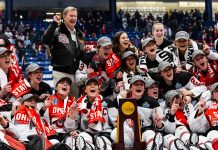The refrain is familiar: How is Minnesota State going to deal with losing two big-name scorers?
A year ago, it was Tim Jackman and Jerry Cunningham. The Mavericks got along just fine, thank you. Went 17 games without a loss. Tied for second in the WCHA. Made the school’s first trip to the NCAA Division I tournament. It was the kind of team you put up on a wall somewhere because it accomplished so much.
Now, it’s Grant Stevenson and B.J. Abel the Mavericks are planning to be without, and while the outcome is unknown, their experience with this kind of situation could go far in keeping them among the top teams in the league.
And last season, they didn’t have the nation’s top returning scorer, either. Shane Joseph, whose 65 points were fourth in the nation last season, returns as a second-team all-American, a first-team all-WCHA selection and a Hobey Baker Award candidate if he can do what Troy Jutting, last season’s WCHA coach of the year, wants to see from all of his players this season — take a step forward.
“I think he’s an extremely talented kid, he’s a very dedicated kid,” Jutting said. “He’s not a great big kid in terms of height (he’s 5-foot-9), but he’s strong as an ox. He’s done all the things you need to do to be successful. He’s incredibly dedicated in the weight room and off the ice.
“Obviously, without having a linemate like Grant there, at least initially, Shane is going to have to assume a bigger role in that it’s not going to be two of them, it’s going to be Shane. Hopefully, he can bring somebody along with him this year.”
Joseph, a senior who’s one of only seven current WCHA players averaging more than a point per game over his career (he has 101 points in 100 career games), had been a roommate of Abel, the Mavericks’ leader as they broke ground with their run to the NCAAs last season. They’re hoping some of that leadership ability rubbed off on Joseph.

While Joseph clearly is the focal point for Minnesota State, the progress other players show likely will be the difference between another top-three finish and getting lost in a crowded WCHA midsection.
Brock Becker had 14 goals as an 18-year-old freshman and could provide some firepower. Jeff Marler started to find his way last season, his first after a broken wrist kept him out in 2001-02. Jake Brenk needs to improve on the 12-point output he had as a sophomore.
The numbers that stood out for the Mavericks last season were 10 — their rank in the 10-team WCHA in penalty killing — and one — their league ranking in penalty minutes. They went hand in hand, in that the Mavs took so many penalties that they were bound to get tired of killing them.
Minnesota State was whistled for 797 minutes’ worth of penalties — 637 in conference play — but the cynic would say that only gave them time to make their penalty kill better. Still, they killed only 73.9 percent of conference opponents’ chances, highlighting the team’s greatest shortcoming.
“We have to do a better job there,” Jutting said. “We just have to work at it more and do a better job of killing it off. And we have to take fewer penalties. If you’re not going to kill them off the way that you need to, you’d better stay out of the penalty box. We’re going to have to take fewer penalties, and when we do go to the box, we’re going to have to do a better job of killing them off.”
Part of that responsibility falls on the goaltenders, an area that saw a transition start during the second half of last season. The Mavericks knew Jason Jensen wouldn’t return for his last season of eligibility because he was graduating and wanted to move on. Jon Volp played most of his 1,036 minutes last season in the second half, including both of the Mavs’ games at the Final Five and the NCAA tournament loss to Cornell.
Jutting said that wasn’t because of the impending change in goal — it gave Jensen the breather needed to keep going, he said — but it gave Volp, now a junior, the introduction to pressure-packed situations that he needed to be the No. 1 this season.
At the start of the season, sophomore Kyle Nixon, who played in three games last season, is slated to be the backup, but if Volp can be solid early on, he’ll likely have the job for good.
“Everybody looks for consistency there: Go out and give us a crack every night,” Jutting said. “I think Jon did that very well last year. From the time we got him in there on a regular basis, he really did not have a bad game for us. That area is not a concern for us right now. If Jon comes back and takes another step from where he was last year, I think that’ll be a real strength for us.”
The team’s weakness may be its defense. The Mavericks will have three freshman defensemen — including Kyle Peto, who got an injury redshirt for last season — among eight blueliners. With at least one of those players in the lineup every night, some of the team’s success will depend on how well the newcomers adjust to their new surroundings.
Steven Johns followed a 20-point freshman season with 26 points last year, signifying he’ll be one of the top players on a Mavericks blue line that isn’t known for its scoring ability.
“His intelligence is what makes Steven such an effective hockey player,” Jutting said. “When you get kids like that, that doesn’t go away. If they’re smart players, they’re smart players.
“I can see Steven taking another step this year in terms of maybe going to that 30-point level as a defenseman in our league, because he is so intelligent and he does see the ice so well and knows where the puck needs to be. I think that’s his strength and I think his strength is something that will continue to get stronger as he gets older and it just comes more and more natural to him.”
Noteworthy
The Mavericks don’t host Colorado College or St. Cloud State, and don’t travel to Minnesota or North Dakota. That means they’ll see the other four NCAA tournament teams out of the WCHA from last season only twice apiece. … Stevenson signed a pro deal with San Jose. … Jutting coached the U.S. Under-18 Select Team to a gold medal in the Junior World Cup in Slovakia in the offseason.


